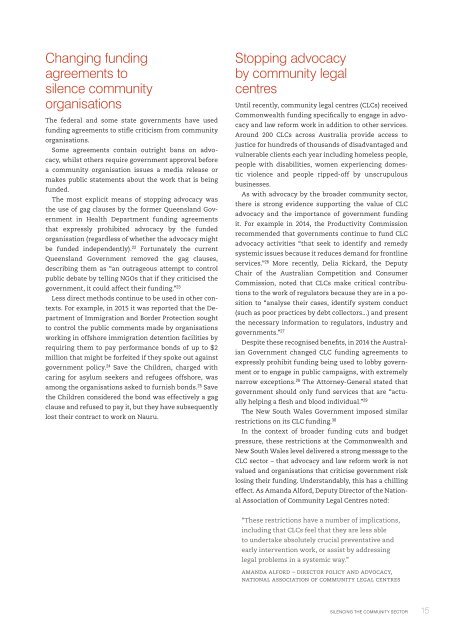Safeguarding Democracy
HRLC_Report_SafeguardingDemocracy_online
HRLC_Report_SafeguardingDemocracy_online
Create successful ePaper yourself
Turn your PDF publications into a flip-book with our unique Google optimized e-Paper software.
Changing funding<br />
agreements to<br />
silence community<br />
organisations<br />
The federal and some state governments have used<br />
funding agreements to stifle criticism from community<br />
organisations.<br />
Some agreements contain outright bans on advocacy,<br />
whilst others require government approval before<br />
a community organisation issues a media release or<br />
makes public statements about the work that is being<br />
funded.<br />
The most explicit means of stopping advocacy was<br />
the use of gag clauses by the former Queensland Government<br />
in Health Department funding agreements<br />
that expressly prohibited advocacy by the funded<br />
organisation (regardless of whether the advocacy might<br />
be funded independently). 22 Fortunately the current<br />
Queensland Government removed the gag clauses,<br />
describing them as “an outrageous attempt to control<br />
public debate by telling NGOs that if they criticised the<br />
government, it could affect their funding.” 23<br />
Less direct methods continue to be used in other contexts.<br />
For example, in 2015 it was reported that the Department<br />
of Immigration and Border Protection sought<br />
to control the public comments made by organisations<br />
working in offshore immigration detention facilities by<br />
requiring them to pay performance bonds of up to $2<br />
million that might be forfeited if they spoke out against<br />
government policy. 24 Save the Children, charged with<br />
caring for asylum seekers and refugees offshore, was<br />
among the organisations asked to furnish bonds. 25 Save<br />
the Children considered the bond was effectively a gag<br />
clause and refused to pay it, but they have subsequently<br />
lost their contract to work on Nauru.<br />
Stopping advocacy<br />
by community legal<br />
centres<br />
Until recently, community legal centres (CLCs) received<br />
Commonwealth funding specifically to engage in advocacy<br />
and law reform work in addition to other services.<br />
Around 200 CLCs across Australia provide access to<br />
justice for hundreds of thousands of disadvantaged and<br />
vulnerable clients each year including homeless people,<br />
people with disabilities, women experiencing domestic<br />
violence and people ripped-off by unscrupulous<br />
businesses.<br />
As with advocacy by the broader community sector,<br />
there is strong evidence supporting the value of CLC<br />
advocacy and the importance of government funding<br />
it. For example in 2014, the Productivity Commission<br />
recommended that governments continue to fund CLC<br />
advocacy activities “that seek to identify and remedy<br />
systemic issues because it reduces demand for frontline<br />
services.” 26 More recently, Delia Rickard, the Deputy<br />
Chair of the Australian Competition and Consumer<br />
Commission, noted that CLCs make critical contributions<br />
to the work of regulators because they are in a position<br />
to “analyse their cases, identify system conduct<br />
(such as poor practices by debt collectors...) and present<br />
the necessary information to regulators, industry and<br />
governments.” 27<br />
Despite these recognised benefits, in 2014 the Australian<br />
Government changed CLC funding agreements to<br />
expressly prohibit funding being used to lobby government<br />
or to engage in public campaigns, with extremely<br />
narrow exceptions. 28 The Attorney-General stated that<br />
government should only fund services that are “actually<br />
helping a flesh and blood individual.” 29<br />
The New South Wales Government imposed similar<br />
restrictions on its CLC funding. 30<br />
In the context of broader funding cuts and budget<br />
pressure, these restrictions at the Commonwealth and<br />
New South Wales level delivered a strong message to the<br />
CLC sector – that advocacy and law reform work is not<br />
valued and organisations that criticise government risk<br />
losing their funding. Understandably, this has a chilling<br />
effect. As Amanda Alford, Deputy Director of the National<br />
Association of Community Legal Centres noted:<br />
“These restrictions have a number of implications,<br />
including that CLCs feel that they are less able<br />
to undertake absolutely crucial preventative and<br />
early intervention work, or assist by addressing<br />
legal problems in a systemic way.”<br />
amanda alford – director policy and advocacy,<br />
national association of community legal centres<br />
SILENCING THE COMMUNITY SECTOR<br />
15


